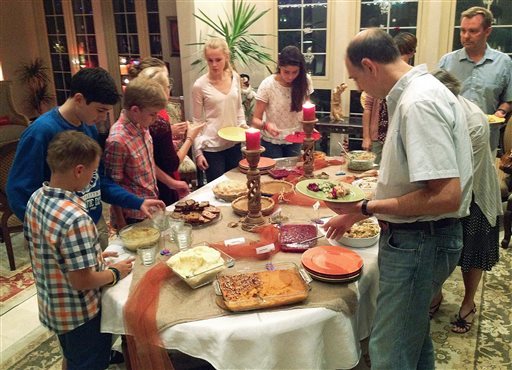Americans abroad celebrate holidays by tweaking tradition
In our global world, you can easily buy a Thanksgiving turkey for roasting in Dubai or Beijing or Tokyo. You can shop for Christmas trees in Bangkok, where stores play Christmas carols throughout December, a constant reminder that Santa Claus can come to town even when you’re 8,000 miles from home.
And yet, if you’re an American family living overseas, the availability of these holiday touchstones doesn’t change the fact that you’re not really home for the holidays.
November and December bring a bittersweet mashup of holiday cheer and homesickness.
Some families do fly back to the U.S. for the holidays. But that can be expensive and challenging, especially with school-age kids.
“During the first few years when our kids were younger, we tried to travel back to the States to visit with our families,” says Melindah Bush, who lives with her husband and three children in Singapore. “But the cost is expensive. And jet lag with children eats up the first week of the holiday and our first week returning to Asia.”
When going home isn’t a good option, how do families stay connected to their holiday traditions?
Some Americans living in Asia share their strategies for making the season as cheerful as possible:
Embrace adventure
For Theresa Starta, the holidays used to be easy. She and her husband, Dan, both grew up in the Pittsburgh suburbs, and were used to seeing both sets of in-laws on major holidays. They got stuffed having two Thanksgiving dinners every year, but it was good: They had football on the TV, familiar dishes in the kitchen and loved ones all around.
After they relocated to Dubai for Dan’s career, they flew home for several holidays with their two children. It’s about a 20-hour trip, with an 8-hour time shift. Then this year they moved to Shanghai, and the even longer Christmas flight home just wasn’t practical.
So this Thanksgiving weekend, the family will decorate their Shanghai apartment with a tree and other decorations to connect with the Christmas spirit. Then, when school ends in late December, they’ll head off on a National Geographic adventure trip to Antarctica.
Theresa says her kids will miss being home with relatives and friends. But their excitement at trekking around Antarctica surrounded by penguins is enough to keep the homesickness at bay.
Build a family of friends
Pam Hurd’s family, now based in Okinawa while her husband serves in the Marine Corps, takes a similar approach. Christmas has become synonymous with travel, and for the past three holiday seasons they’ve traveled with American friends who have become like a second family.
“We are so looking forward to spending this Christmas in Singapore and Malaysia with our friends,” Hurd says. “We are there for 12 days and are calling it our ‘12 Days of Christmas.’”
Like the Startas, in early December the Hurds kick off the season by putting up a small, artificial Christmas tree and a few familiar decorations from home. Hurd plays Christmas songs and bakes cookies with the kids using family recipes, and they sometimes attend holiday events on the military base where they live. Then they’ll fly south, celebrating Christmas at a Club Med in Singapore, with a visit to Malaysia’s Legoland theme park.
After four years overseas, Hurd’s kids (now 8, 11 and 13) have come to embrace holidays on the road. They’ve hunted for Easter eggs in Taiwan, and worn their candy-cane Christmas pajamas everywhere from Hong Kong to Indonesia.
Keep a few traditions going
Creating new traditions is important for many American expat families. Bush spent much of her childhood in California, and her husband, Nathan, grew up in North Carolina, so their holidays in those warm places didn’t involve sledding or building snowmen. But they were filled with extended family, Thanksgiving turkeys in the oven and Christmas mornings at home.
Now, in Singapore, they’ve kept their Thanksgiving traditions going while discovering new ones during potluck suppers with friends.
“We and our American friends make the traditional foods like turkey, stuffing, sweet potatoes, green-bean casserole and pumpkin pie,” Melindah says. “We also invite our non-American friends to join and share their traditional foods. So we have had Chinese and Asian friends bring noodles and dumplings. Scandinavian friends have brought various appetizers — often herring. Our Aussie friends make pavlova, and British friends bring a variety of salads and breads.”
Theresa Starta did the same in Dubai last year on Thanksgiving; guests came into the kitchen to see the perfectly roasted turkey emerge from the oven, and she explained a bit about each dish. She told her international friends that green-bean casserole is “sort of like everybody’s crazy uncle who has to be there,” but most family members don’t really want to have any.
She loves “the giving aspect of preparing this meal for somebody who’s never had it before,” and was delighted to find that the casserole, of all things, turned out to be the group’s favorite: “Everybody came back for seconds.”
Don’t try to replicate the past
Lauri Barrett’s childhood memories of holidays in New Hampshire are Christmas-card perfect: lots of snow-covered pine trees and holiday lights twinkling in the chilly air. But she’s learned that trying to replicate those memories with her very global family (her husband, Lincoln, is from New Zealand, and they are raising their 9-year-old daughters, both adopted from China, in Thailand) just doesn’t work.
“If you try to recreate it, it’s just going to fall short,” she says. “You have to make it different, so you don’t have that nostalgia.”
Barrett’s daughters attend an American school but don’t have Thanksgiving off. So earlier in November, she’ll host a Thanksgiving potluck lunch for members of the American Women’s Club of Thailand.
For Christmas, the family will travel to South Korea for a ski trip. Barrett says she’ll bring as many gifts as possible, and Santa will make an appearance at their hotel, as will the Elf on a Shelf.






